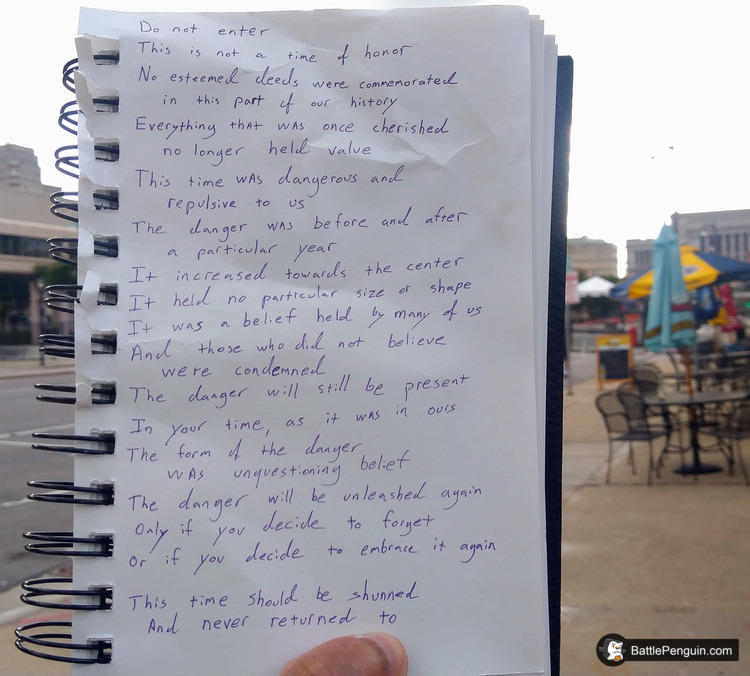Mexico's Independence Day - Chicago, IL
MiscellaneousWhy I No Longer Hate the Police
Politics
My mother told me that when I was very young, I would always look out the window in the evenings for the police car that would often sit on our street each night during the late shift. On a night when a car didn’t appear, and my father couldn’t get me to sleep, he would put me in a stroller and walk around until we saw one. I grew up on shows like Dragnet and games like Police Quest, and when I told my neighbors that I wanted to be a cop when I grew up, they’d tell me, “You’re too smart for that.”
Read MoreDo Not Enter
Poetry Read More
Read More Opening Night of the 2020 Democratic National Convention in Milwaukee
PoliticsMoving from YouTube to PeerTube
Technology
Back when I first started posting videos, I used Vimeo. Even though YouTube was the dominant video site, I wanted to support the underdog. I even bought a Vimeo Pro account. At the time, Vimeo had higher quality video than YouTube, but nowhere near the level of discoverability. Eventually I started posting on YouTube; both new content and some reposts of my older videos. It’s 2020 and YouTube, as well as the rest of big tech, is continuing to remove content they don’t agree with from their platforms. None of my videos have ever gotten a large number of views, and none are monetized, so I might as well copy them to a PeerTube instance I control. If you do run a YouTube channel with any type of significant viewership, I highly recommend backing up your videos, in the event you may need to self-host your content in the future.
Read MoreBack the Blue - Homan Square, Chicago
PoliticsCHAZ, Seattle and the Mob
PoliticsPlants and Soil Sensors
Technology
A few years back, I did some work for a sensor network startup. Since then, I’ve always been on the lookout for new sensor hardware and tools. I just moved into a new apartment, and discovered the VegeHub when searching for soil moisture sensors to use on my flower boxes.
The VegeHub supports sending your data to a few online storage providers (a.k.a The Cloud), or to a custom web service. I considered adding support to BigSense, a sensor web service I wrote in Scala. Instead, I decided it would be a good time to experiment with a time series database. I wrote a small Python Flask application called SenseFlux to store VegeHub data in InfluxDB. In this post, I’ll show you how you can setup SenseFlux and InfluxDB using Docker, and graph sensor data using chronograf. Let’s get started.
Read MoreSecondary Effects
Politics
The first week of June, I received an e-mail from one of my best friends in London. Her flatmate had committed suicide. Across the world, rates for attempted suicide are growing dangerously amid the continued lockdowns. Serious child abuse emergency room visits have risen by by over 35%, while surveillance into abuse incidents is hindered with many schools remaining closed. The civil unrest, riots and other secondary effects are from the response to the pandemic, but not the virus itself. So far, every indication shows the fatality rates for this virus are in decline. Yet despite what should be good news, leaders from around the world seem to be doubling down on the existing narrative of fear to justify continued behavior modifications, despite the growing secondary effects of the lockdowns.
Read MoreA History of my Mechanical Keyboards
Technology
Years ago, at a white elephant Christmas party, I ended up with leopard print keyboard stickers. I bought a new keyboard to get the most out of these stickers, and used it for months as the stickers began to wear off. However, the space bar broke in less than a year. I had gone through many keyboards over the years, and all of them had been disappointing with their disposable build quality and lack of longevity. I decided to try a Das Keyboard Ultimate. It was my first foray into the world of mechanical keyboards, and would lead to many years of trying different key switches and purchasing custom key caps. This post is a brief history of the various mechanical keyboards I’ve bought, sold and given away over the years.
Read More